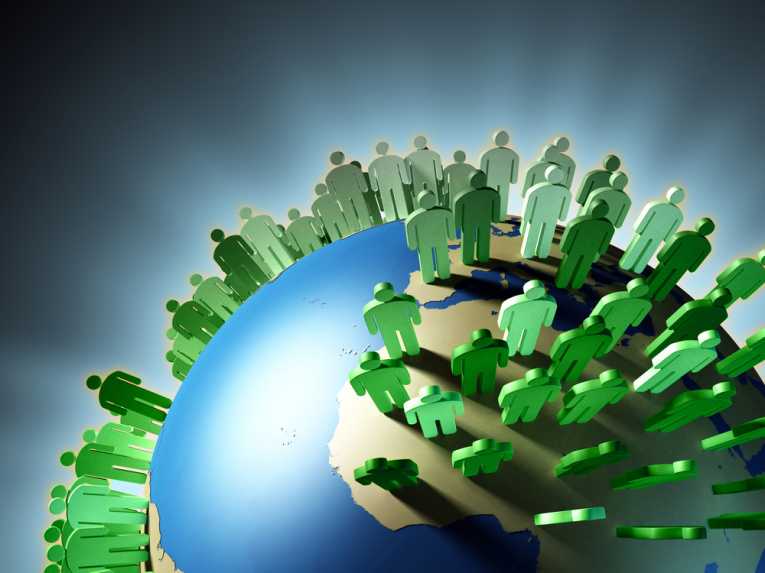On 11th July 1987 the birth of Matej Gashpar of Zagreb in Croatia is said to have tipped the world's population over the five billion mark and as a result the United Nations World Population Fund (UNPF) decided to recognise this milestone. From henceforth 11thJuly has been designated as World Population Day.
From the beginning of time it took until 1804 for the world's population to reach the one billion mark, but only a further 123 years to reach two billion in 1927. Population rise during the 20th century really took off. By 1960, three billion had been reached, but within 14 years, in 1974, the total had reached four billion.
Only 13 years elapsed before Matej Gashpar's birth of brought the total to five billion and 12 years later, the UNPF designated 12th October 1999 as the Day of Six Billion. And so it continues. 31st November 2011 was declared the Day of Seven Billion and by now United Nations Fund for Population Activities (UNFPA) was beginning to show serious concern.
A programme was introduced that would seek to build global awareness around the opportunities and challenges associated with a world of seven billion people and inspire individuals and organisations to take action.
Current predictions for the future consider that there will be a continued increase in population, but a general steady decline in the population growth rate. The United States Census Bureau (USCB) estimates that by 2027 eight billion people will live on the planet, with the nine billionth mark being reached in 2046.
These future projections are obviously highly speculative, with estimates for 2050 ranging from a low of 7.4 billion to a high of 10.6 billion. Longer-range predictions vary even more. One view is that by 2150 world population will have declined to 3.2 billion, while another view is that it will have increased to 24.8 billion. An extreme prediction is that world population will have risen to 256 billion by this time.
Unfortunately the resources of the world are finite and with no more arable land or fresh water to spare, it is becoming increasingly impossible for food production to keep pace with these rises in population. To make matter worse, the world's stocks of natural resources that support human life-food such as fresh water, quality soil, energy and biodiversity are all being polluted, degraded or otherwise depleted.
In the 1960s when world population was a mere three billion, approximately 0.5 hectares of cropland per capita was available, but within 40 years this had dropped to 0.23 hectares. Soil worldwide has become seriously degraded and current erosion rates are higher than ever, with estimates of 10 million hectares of cropland being abandoned each year.
Another 10 million hectares is lost each year as a result of salinisation, due chiefly to inappropriate irrigation or drainage methods. In many cases the only way for land to be at all productive is by the use of large quantities of fossil fuel-based fertiliser.
These problems are most serious in the developing world. China and India together have about a third of the world's population. In China, for instance, the population currently stands at some 1.35 billion and is growing at an annual rate of about 0.6%. With its predominately young population this is expected to increase for another 50 years. India has around 1.2 billion people, with an annual growth rate of about 1.7%. If this trend continues, by around 2050 the population of India will have doubled.
Africa has of course been hit by an AIDS epidemic, but in spite of this the populations of most countries continue to rise. The populations of both Chad and Ethiopia are expected to double before the mid-2030s.
Even in the so-called developed world the population-growth problem is still significant. The US population now stands at some 300 million. It has doubled in the past 60 years and estimates are that it will have reached 600 million by the 2070s.
Even the estimated figure of nine billion for the world's population in 2050 is said to be questionable, since a large share falls within the 15-40 age group, where reproduction rates are high.
This brings us to a contentious area of what seems to be an intractable problem. If the world's population continues to grow and it becomes increasingly difficult to feed this number of people, should something be done to limit its number?
With thoughts of overpopulation in mind, people began to put forward arguments to justify some form of population control. However, many people would have serious moral objections to the use of any plans to use contraception in order to control population.
The United Nations 1968 International Conference on Human Rights makes it clear that parents have a basic right to determine freely and responsibly the number and spacing of their children.
It is argued that if rich countries were to stop consuming more than their fair share of the world's resources the problems of a rising population would diminish and there would be no need for population controls to be imposed upon poor nations.
The obvious answer is for a united policy to link the major players in the world, but unfortunately the major players seem unable to reach agreement. Awareness-raising events associated with World Population Day can help, but meanwhile the world just seems to bumble along and hope for the best.















